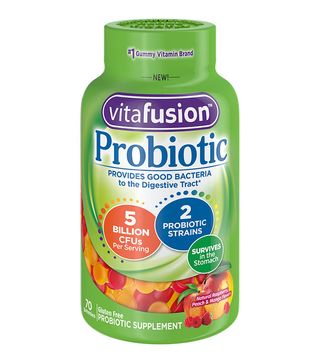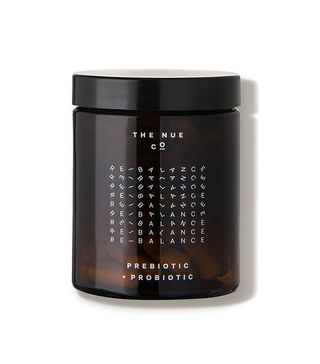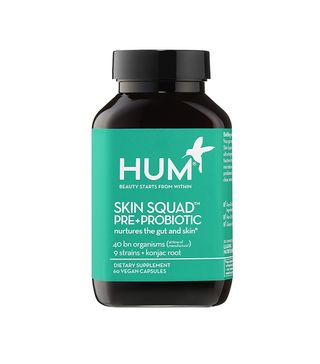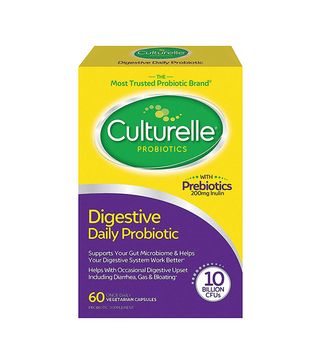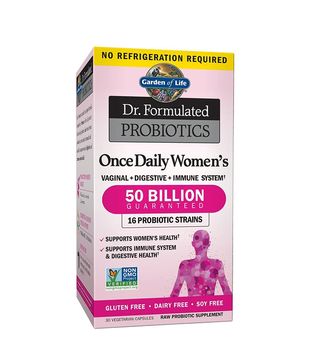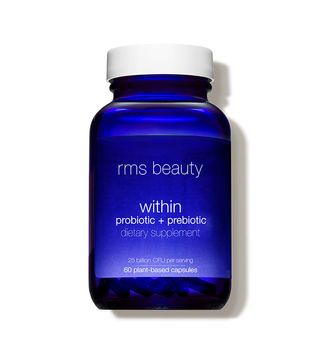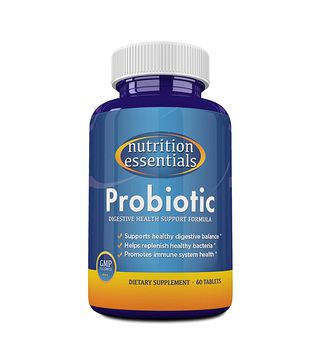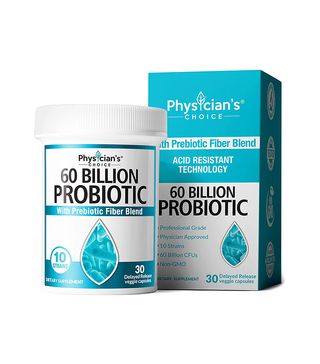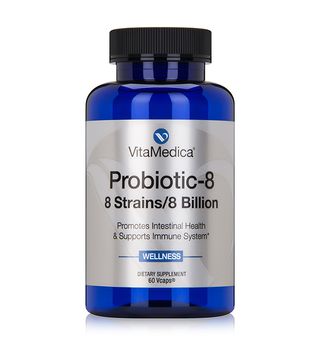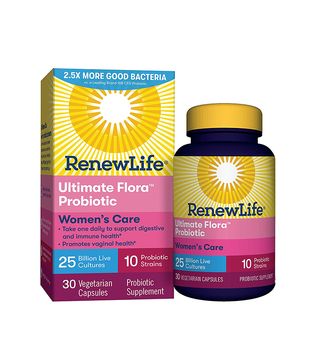Here's Why You Should Care About Probiotics

There's a lot out there about the benefits of probiotics. A lot of companies tout the amazing effects probiotics will have on your body and your overall health. And they're popular—the National Center for Complementary and Integrative Health (NIH) cites that data from the 2012 National Health Interview Survey shows that four million U.S. adults reported using probiotics or prebiotics in the past 30 days, and the use of probiotics had quadrupled between 2007 and 2012. But what exactly are they, and are they safe to take?
It all starts with the gut. "Probiotics are living microorganisms (bacteria) that can improve the health of the gut," says Nicole Avena, MD, assistant professor of neuroscience at Mount Sinai School of Medicine and visiting professor of health psychology at Princeton University. "Our gut is an ecosystem, and probiotics are part of that ecosystem and important for ensuring good digestive health." Yes, they are bacteria, but they're the "good" kind that is the same or similar to what's inside your body right now, according to the Mayo Clinic.
This all sounds great, but it's important to note that not all probiotics are the same, and they have different effects on different people. "Probiotics don't work the same in all people, so it is important to make sure you are taking a probiotic that is right for you," Avena advises. "For example, some probiotic blends contain strains that are designed to promote women's health, whereas others contain strains that are best to promote digestive health and general health for kids."
Where Can I Find Probiotics?

If it seems like they're everywhere, you're pretty much right. "You can find probiotics in a few different places," Avena says. "Foods are obviously a great source—you can find probiotics in fermented foods, yogurt, sauerkraut, and many other probiotic-fortified foods and drinks are available. Supplements are also a great way to get probiotics in your diet. When looking for a supplement, you want to select one that will meet your specific needs and contain the cultures that are relevant. If you are looking for something easy to take, Vitafusion makes a great gummy probiotic."
And like we said before, they're also already in your body, too. The Cleveland Clinic says that the types that are "naturally found in your intestines include Saccharomyces boulardii (a yeast) and bacteria in the Lactobacillus and Bifobacterium families of microorganisms."
What Are the Pros?

"One benefit of probiotics is that they can help improve our immunity by providing a balance in the environment in our gut," says Avena. "When a 'bad' bacteria hits us, our 'good' bacteria in the gut are better able to respond and ward off illness. Probiotics also can promote nutrient absorption and help to break down lactose (which can help those who are sensitive to lactose). Also, prebiotics, which help feed the probiotics in our guts, are important to gut health. Prebiotin Prebiotic Fiber can stimulate good bacteria growth throughout the entire colon, thus optimizing the prebiotic (and probiotic) benefits."

But lot of research still needs to be done on the reported benefits of probiotics, like its ability to help with digestive issues (like diarrhea or irritable bowel syndrome), vaginal or urinary tract infections, eczema in children, inflammation, and more. The NIH states that while there is still preliminary evidence on the benefits of probiotics, "We still don't know which probiotics are helpful and which are not. We also don't know how much of the probiotic people would have to take or who would most likely benefit from taking probiotics."
In general, healthy people can take probiotics with very minimal side effects (like bloating, gas, or diarrhea). "Probiotics can actually help with the gastrointestinal side effects that sometimes emerge when taking an antibiotic," Avena says. "There is some evidence that probiotics can interfere with some heart medications, so it is important to talk to your doctor if you are taking any medication before taking any supplement (probiotic or other)." The Mayo Clinic advises against consuming them if you get infections often, have a weakened immune system, or are allergic to sources of probiotics like dairy.
And What Are the Cons?

There's a lot we still don't know about them. The NIH states, "Although some probiotics have shown promise in research studies, strong scientific evidence to support specific uses of probiotics for most health conditions is lacking. The U.S. Food and Drug Administration (FDA) has not approved any probiotics for preventing or treating any health problem. Some experts have cautioned that the rapid growth in marketing and use of probiotics may have outpaced scientific research for many of their proposed uses and benefits."

Since most probiotics are sold as dietary supplements, the FDA doesn't fully regulate them. According to the NIH, manufacturers can make claims about how the product affects the structure or function of the body without FDA approval, but they can't make health claims without approval.
That means some labels might be tricky to read or have misleading information, making it hard to tell the product's true benefits. You might be buying something that does nothing for you (or might not exactly be safe). Do your research before you buy.
So What Should I Do?

Since there's a lack of conclusive evidence on the benefits of probiotics and the supplement market is unregulated, proceed with caution, but that doesn't mean you have to rule them out completely. Discuss your options with your doctor. You'll both be able to decide together which, if any, are right for your body.
Probiotic Supplements to Consider
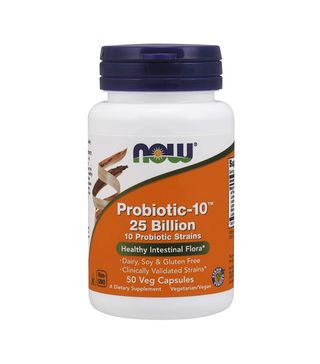
Next up: Gut Experts Share All the Myths and Truths of Probiotics
This article was originally published at an earlier date and has since been updated.
Disclaimer
This article is provided for informational purposes only and is not intended to be used in the place of advice of your physician or other medical professionals. You should always consult with your doctor or healthcare provider first with any health-related questions.
Sarah is lifestyle writer and editor with over 10 years of experience covering health and wellness, interior design, food, beauty, and tech. Born and raised in Los Angeles, she attended New York University and lived in New York for 12 years before returning to L.A. in 2019. In addition to her work on THE/THIRTY and Who What Wear, she held editor roles at Apartment Therapy, Real Simple, House Beautiful, Elle Decor, and The Bump (sister site of The Knot). She has a passion for health and wellness, but she especially loves writing about mental health. Her self-care routine consists of five things: a good workout, “me” time on the regular, an intriguing book/podcast/playlist to unwind after a long day, naps, and decorating her home.
-
 This Beauty Blogger's Wind-Down Routine Is Anything But a Snooze
This Beauty Blogger's Wind-Down Routine Is Anything But a SnoozeSee her go-to workout and her favorite vitamins.
By Virginia Yapp
-
 13 Products That Will Step Up Your Self-Care Game From Home
13 Products That Will Step Up Your Self-Care Game From HomeGet that glow from within.
By Natalie Gray Herder
-
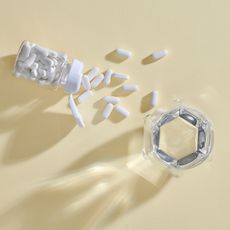 Don't Forget This Vital Ingredient When It Comes to Gut Health
Don't Forget This Vital Ingredient When It Comes to Gut HealthIt's crucial.
By Sarah Yang
-
 FYI: This Vitamin Affects Your Skin, Immune System, and Eye Health
FYI: This Vitamin Affects Your Skin, Immune System, and Eye HealthIt's a big deal.
By Sarah Yang
-
 This Fatigue-Fighting Solution Might Be Better Than a Cup of Coffee
This Fatigue-Fighting Solution Might Be Better Than a Cup of CoffeeIt will give you a boost.
By Sarah Yang
-
 Taking This Supplement Improves Sleep, Regulates Blood Pressure, and More
Taking This Supplement Improves Sleep, Regulates Blood Pressure, and MoreIt's an essential mineral.
By Sarah Yang
-
 The Only Wellness Deals Worth Buying on Amazon Prime Day
The Only Wellness Deals Worth Buying on Amazon Prime DayTime to shop.
By Sarah Yang
-
 Taking This Daily Supplement Can Give You Whole-Body Protection
Taking This Daily Supplement Can Give You Whole-Body ProtectionAre you getting enough of it?
By Sarah Yang
